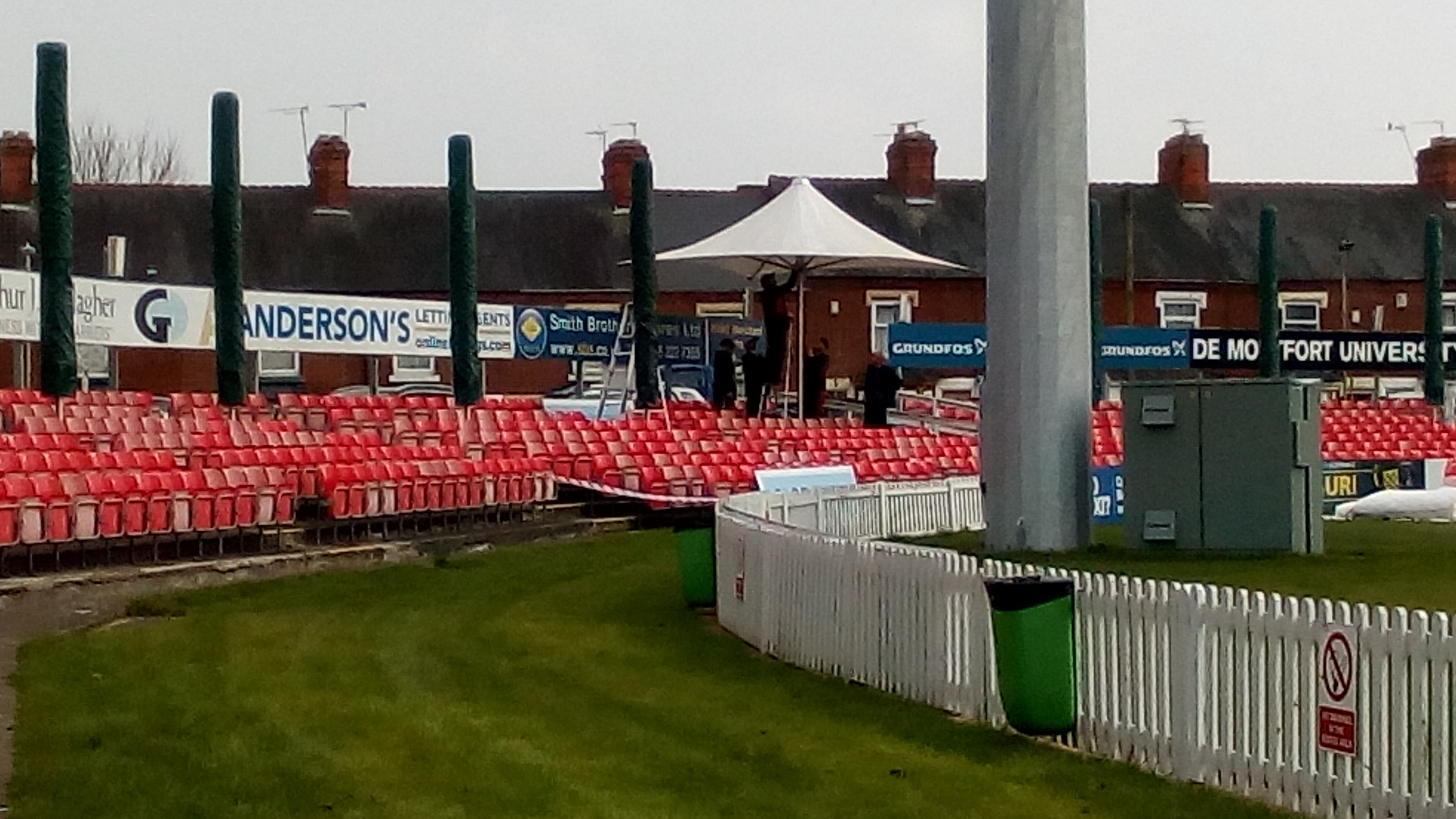And then I woke up, and it was all a dream …
Leicestershire (390-3 dec. & 245-0) drew with Loughborough MCCU (152), Grace Road, 2-4th April 2020
I seem to find it harder each year to find something new to say at the start of the season, but then, perhaps, novelty is beside the point. There, is, of course, the promise of a new start, a clean slate, a blank piece of paper on which any story could be written, but the essence of it lies in the rediscovery of the familiar, of finding that those familiar scenes are still there. Winter has passed, Spring has returned, as it sometimes felt during the Winter that it might not, and, with it, the cricket.
The first game at Grace Road seldom lives up to our wintry day-dreams of the platonic spring day, if only because it is always against Loughborough University, and the ground is only half-awake. We enter not through the usual, welcoming, gates, but through a gap in the wall at the end of a bottle-strewn alley, but the first sight of the ground, even if it is yet to cast off its winter weeds, its parasols unfurled, still feels like a release : in our minds’ eyes, we see it, not under grey skies and sparsely populated, but bathed in mid-summer light and humming with life. It is not the first day itself, but the sure and certain knowledge of the six months still to come that makes us feel newly glad to be alive.

Given the age of many of our members, and most of those who turned up for the first day, ‘glad to be alive’ is not an idle figure of speech : it is always a relief to find that familiar faces have survived the Winter. Although the general bonhomie may not survive far into the season, its beginning is celebrated with handshakes, backslapping and even the occasional hug, as friends, reunited, congregate in convivial groups, or share their winter-news over a drink in the bar. I am afraid that we sometimes take these pleasures and liberties, however small in themselves, too much for granted, and the start of the season makes us feel it.
Leicestershire, as is the convention in these games, batted, and the first ball of the season was faced by Paul Horton, who has now been relieved, or possibly relieved himself, of the captaincy. Unfortunately, perhaps due to the dim light, or the remnants of dew in the pitch, he played down the wrong line to a full, straight, delivery and was bowled. This was less unpropitious than it might seem, given that the bowler was Alex Evans, who is contracted to Leicestershire and will be available to strengthen the bowling later in the season.
After taking a few overs to acclimatise (Evans’ first three overs were all maidens), the incoming Colin Ackermann then played the hare to opener Hassan Azad’s tortoise, scoring freely on the off-side, in particular, to reach his fifty shortly before lunch, by, rather gratuitously, lofting Leicestershire academician Don Butchart, who had been brought on for the last over, over long on and into the, mercifully underpopulated, car park. Azad, who had not departed from his trusted techniques of patient accumulation, had then made 17.
During the lunch hour, I dropped into the office (buzzing with anticipation) to renew my membership (excellent value at £99, given the number of days of cricket, particularly in the coming two months, it will entitle me to see), then dropped into the Meet, busy despite its limited menu, and picked up my ‘Playfair’ from the Friends of Grace Road shop, providing its usual reassurance, so little does it change, that, whatever else may be wrong in the world, the cricket season will inevitably return in the Spring.
Shortly after lunch, in a stroke that might have been an act of deliberate self-sacrifice, Ackermann chipped a half volley from Evans straight to cover point. The manner in which the next man in, Mark Cosgrove, emerged from the pavilion suggested that he felt in the form of his life, but also that he was feeling the cold. The first two deliveries he ostentatiously left alone, the third tested his powers of abstinence too far, and he was dropped at second slip (the edge was audible to all in the ground, except, if his body language were to be believed, the batsman himself).
After reaching twenty more by luck than judgement, Cosgrove’s co-ordination seemed to return, if not his self-control, and three good balls were stroked, with his usual incongruous delicacy, through the covers for four. The next ball must have hit some foreign object on the pitch, or perhaps he was unsighted by light reflected off a car windscreen, because it removed his off stump. He appeared as incredulous at this turn of events as ever, though, given the cold, less reluctant to leave the field. Cosgrove is no longer quite the batsman he was, but he is still a joy to watch, and we are lucky to have the prospect of at least one last full season in which to watch him.
Harry Dearden came to the crease shortly before 2.15, with the total on 129-3, and Hassan Azad three short of his half-century. Dearden, who does not have the credit at the bank that Ackermann and Cosgrove enjoy, is in no position to spurn a chance to make a substantial score, and, reverting to his earliest manner, scored at a rate that made his partner look like a chancer : by tea, the pair had crept surreptitiously to 210-3. With the evening chill creeping in, I crept off too at 5.00, by which time the score was approaching 300, in the stealthy manner of a game of grandmother’s footsteps. Unfortunately, my departure coincided with the rush hour, and I spent the journey home pressed against a window by a large man with little conception of personal space and a nasty cough.
I arrived a little late for the second day, having stopped off at my favourite Café Roma (cash only!) for a macchiato and a brace of cannoli. The warmer weather had brought some of the more elderly element of Leicester’s café society out, and we were packed together cosily, like anchovies in a tin. As I was not expecting any dramatic developments at Grace Road, I passed some time strolling through the crowded lanes, browsing aimlessly. How pleasant it can be to wander at will through a crowded city, when the weather is fine and the mood relaxed!
When I finally arrived at the ground, Azad and Dearden were, as I had suspected, still at the crease. The scoring rate had increased slightly, but only in the manner of an elderly and overworked donkey goaded into a jog-trot. By lunch, the score had advanced to 390 : Azad had made his century at some point in the morning, and Dearden was closing in on his (assuming the game was first class, his maiden century). The students must have been wondering whether their turn to bat would ever come, like a younger brother in the back garden.
There had, incidentally, been an amusing incident just before lunch. You may remember that, in the corresponding fixture a few years ago, when Hassan Azad was still playing for Loughborough, Charlie Shreck, frustrated by his obdurate batting and Loughborough’s failure to declare, had directed a few unfriendly remarks at him (‘The Times’ alleged that he had threatened to kill him). Umpire O’Shaughnessy reported the incident, Shreck was suspended and Leicestershire were subjected to a points deduction. Alex Evans (who obviously knows Azad) pantomimed a repetition of the incident : the batsman seemed highly amused, Umpire O’Shaughnessy, perhaps, less so.
To the surprise of most, it emerged that Leicestershire had declared at lunch. Although I can see why they would have wanted the bowlers to have a run out, it did seem hard on Dearden, who was left on 94*. It is true that he had every opportunity to make his century over the previous six hours, but we will have to hope that the disappointment will not have the same effect on his psyche as it did on Graeme Hick’s, in similar circumstances. It was noticeable that he spent his time in the field with hands in pockets, and dropped a couple of catches (though not, perhaps, ones he would normally have caught).
The Leicestershire bowlers did not have the time to put in quite as many overs as they had hoped, although Wright, Griffiths and Taylor (apparently now fit) all claimed three wickets, and Mike (a little loose) one. Only Joe Kendall, of the batsmen, made more than a start, falling two short of his fifty while trying to reverse sweep a full delivery from Taylor off his stumps. The innings ended shortly after 5.30, with the score on 152, leaving Azad and Horton to play out the remaining overs (Horton surviving a couple of persuasive shouts).
If it had not been for the balmy weather, and the general feeling that we were glad just to be there, Leicestershire’s tactics on the Saturday morning might have attracted adverse comment. Azad was only marginally more fluent than he had been in the first innings, and Horton defended his wicket as if it were his life, against some tired bowling of moderate quality. In the second hour, Evans, knowing the chink in Azad’s armour, posted two short legs and a leg slip, and bowled short from around the wicket. Clearly discomfited, Azad fended one delivery just over one of the short legs, another just wide, and then, attempting a pull, deflected the ball hard on to his helmet. Although he was able to leave the field unaided, he appeared disorientated.
After lunch, Tom Taylor, who had replaced Azad, livened proceedings with some firmly driven boundaries until, bending to tie a loose shoelace, he appeared to put his back out, and had to be helped from the field. Surprisingly, it was Harry Dearden who replaced him. As the afternoon wore on, it was clear that he was not inclined to miss another chance of a maiden hundred, and, reverting to his one-day style, hit the bowling to all (or most) parts of the ground. Justifiably suspicious that Ackermann might be inclined to shake hands on a draw at 5.00, he accelerated further as that hour approached, passing his hundred at 4.50, to wild, and only half-ironical, applause from the few spectators who remained. The end of play was postponed to 5.10 to allow Horton to catch up and make his century as well.
There were some worrying pieces of news in the aftermath of the game. Taylor has apparently suffered a recurrence of the back problem that kept him out for most of last season, and Hassan Azad will have to miss at least the first two Championship games under the concussion protocol. Alex Evans had been reported to the ECB by Steve O’Shaughnessy, and it is possible that any suspension will mean that he will be unavailable for Leicestershire when term is finished (as it only affects first-class fixtures). The report in ‘The Times’, which alleged that Evans had kneed Azad in the groin, and threatened to tear him limb from limb and dump the pieces in the Soar, cannot have helped matters.
One or two of the members were also a little perturbed by newspaper reports of a new flu-like virus that had emerged in China in the last weeks of March, apparently caused by someone in Wuhan Province thinking that it would be a good idea to eat a bat. But I’m sure that it will take more than that to spoil the prospect of a new cricket season.
And then I woke up …


















